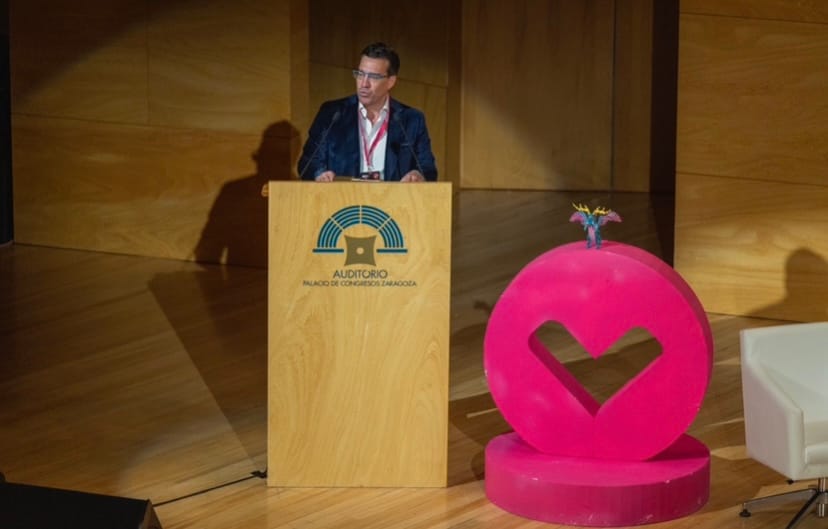Can Happiness be taught? Raúl Varela Barros is building Cities of Happiness

In the latest World Happiness Report, our attention is directed towards understanding the varying degrees of happiness experienced by individuals across different life stages. While Shakespeare’s portrayal of the later stages of life in “As You Like It” depicts them as profoundly melancholic, contemporary happiness research unveils a more complex narrative, one that evolves with time. With depression affecting young and old alike, and statistics showing an alarming rise all around the world, we want to discover the most recent insights into the future of happiness and the solutions available to rise the levels of happiness in the world’s youth, the elderly, and all those in between.
Age and generation both matter for happiness. As between generations, those born before 1965 (Boomers and their predecessors) have life evaluations about one-quarter of a point higher than those born after 1980 (Millennials and Gen Z). Within each generation, life evaluations rise with age for those in the older generations and fall with age for the younger ones, with little age effect for those in between.
World Happiness Report
The world is challenged by a myriad of complexities and the question I want to ask is how can we inspire millions of depressed people to be happy? Against the backdrop of an ever-growing global population projected to reach ten billion by the year 2050, the imperative to cultivate joy and well-being becomes not just a noble pursuit but a fundamental necessity. This is an invitation to enter the World Happiness Foundation with an open mind, as they are on a monumental mission, with a bold ambition: to touch the lives of 25 million individuals, igniting a ripple effect that reverberates through communities and nations, ultimately shaping a happier, more fulfilled world.
We sit down with Raúl Varela Barros, the CEO of the World Happiness Foundation, exploring the strategies, challenges and potential impact of their mission to empower people and communities worldwide. Through the lens of possibility, we looked into the layers of this global initiative, exploring the mechanisms by which 25 million lives will be touched and transformed, setting the stage for a future defined by shared prosperity and enduring happiness.
Raúl Varela Barros, a lawyer, entrepreneur, personal and business mentor, social entrepreneur, author and professor of happiness and well-being across multiple business schools, serves as the CEO of the World Happiness Foundation. With over 25 years of expertise in business law and as a founding partner of diverse companies, he now dedicates his time to writing and teaching about happiness and well-being in academic settings.
In his role as CEO of the World Happiness Foundation, he leads a global movement aimed at fostering a freer, more conscious and happier world for all. Raúl utilizes his extensive experience to mentor individuals and entrepreneurs, guiding them towards a life of self-knowledge and wisdom and helping them enhance their personal lives and businesses.
What inspired you to transition from a successful career in law and entrepreneurship to focus on happiness and well-being?
I had been in the courts for more than 20 years and I needed to turn around my professional and business activity. The World Happiness Foundation project is exciting, with great goals, worldwide, you meet many wise and interesting people and it is a source of learning and daily personal growth. It is a privilege to lead the Foundation from Spain. I was very excited from the beginning. In addition, sharing leadership with a person like Luis Gallardo is very comforting, as he is a very creative, understanding person from whom you can learn a lot every day.
As the CEO of the World Happiness Foundation, could you share some insights into the organisation’s mission and how it aims to achieve a freer, more conscious and happier world?
At the Foundation we work, mainly, in the field of education, physical, mental and emotional health, and in the world of leadership, mainly in the world of business and public policies. These three pillars are fundamental to be addressed together with other institutions and experts who lead with us in many countries to try to achieve a freer, more conscious and happier humanity
How do you believe the principles of happiness and well-being can be integrated into business practices effectively?
The most important thing is to put people at the center. There must be the utmost care and respect for each of the company’s employees. Likewise, there must be a fair salary and nowadays active listening, companies with purpose, to be able to prosper, that employees can be trained and diversity of all kinds is highly valued.
What are some common misconceptions about happiness that you’ve encountered in your work, and how do you address them?
The most traditionally erroneous concepts are considering leadership from an authoritarian point of view, thinking that you are happier the more money you have – even if you don’t have time for family and friends -, believing that working long hours is synonymous with strength, leadership, believing that you always have to work seriously, are some of the most common mistakes of companies that have a 20th century mentality. Today, we need to make things easier for people and exercise humanistic leadership in the 21st century
In your experience as a mentor, what are some key strategies or practices individuals can adopt to enhance their personal happiness and well-being?
I think a good mentor has to be a person who has a lot of knowledge and a lot of experience. In this way, you can be useful to many people by directly giving them advice and sometimes telling them clearly what they need to do. A mentor who is an expert in happiness must know how to transmit the basic levers to be happy to their mentees.
How do you approach the balance between personal happiness and professional success in your own life, and how do you advise others to achieve this balance?
I think the most important thing is to be consistent, that is, to think and do the same things. Do not fall into contradiction. It’s very important to be authentic, to be different, not to be just another person. Have your own personality. I believe that happiness can be trained on a daily basis. We believe that we must go further. We must not be happy, we must be happy and transmit it daily to all the people around us, in our job and everywhere we go.
Can you share some examples of successful initiatives or programs implemented by the World Happiness Foundation to promote happiness and well-being on a global scale?
We are currently working mainly on three initiatives: Schools of Happiness, Cities of Happiness, and Wellness and Happiness Organizations. We are also very focused on the world of happiness coaching and we are just preparing our own Master’s degree. In my case, I am very focused on the project of happiness organisations and companies. We have reached an agreement with the international certifier AENOR, and soon a seal for all types of organisations will be launched on the market, which will help them to improve their well-being and happiness policies.
As a professor of happiness and well-being, what are some fundamental principles or teachings you emphasise in your courses or workshops?
In my classes, as a happiness teacher, I like to talk about the 22 levels of happiness that I describe in detail in my latest book. I try to give my students tools so that they can deepen their study of the different ways to be happy.
What role do you believe governments and policymakers should play in fostering a happier and more conscious society, and how can individuals contribute to this goal?
I believe that our politicians have a great responsibility to create a happier world. They just promote public policies that help its citizens to have a fuller life and greater well-being. To do this, I believe that they should be advised by experts and institutions such as ours. We have recently created the City of Happiness initiative to be able to advise mayors in many cities on five continents.
How do you measure the impact of the World Happiness Foundation’s initiatives, and what metrics or indicators do you find most valuable in assessing progress?
There are many metrics and indicators to assess progress. Speaking of happiness, I think one of the most important is the World Happiness Report, which is lead by Galup, the University of Oxford, the United Nations, and which is lead as well by one of our board members , the canadian economist John Helliweel.
As an author, could you discuss any upcoming projects or publications related to happiness and well-being that you’re currently working on?
I have just published a book with our publishing house: The World Happiness Press . The book is titled “Whoever Was Here Right Now” and is an ode to happiness, a call and an invitation to all the people of the world to have a fuller and happier life. I am currently in the middle of a promotional campaign throughout Spain and Latin America.
Looking ahead, what are your aspirations for the future of the World Happiness Foundation, and how do you envision its role in shaping a better world for generations to come?
The foundation’s mission spans the globe on an immense scale. We have a meaningful but audacious goal: by the year 2050, we aspire to contribute to the happiness of the anticipated ten billion individuals inhabiting the planet.
Over the next 26 years, we envision reaching out to 25 million individuals, each empowered to positively impact 400 others within their sphere of influence. It’s undoubtedly a monumental challenge, one that resonates with my passion for tackling ambitious goals. That’s why I find such fulfilment in being involved with the World Happiness Foundation.
Do you want to share your story and inspire our readers ? Know that YOUR EXPERTISE is paving the way for a brighter, happier future.




